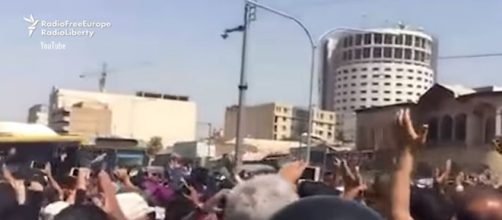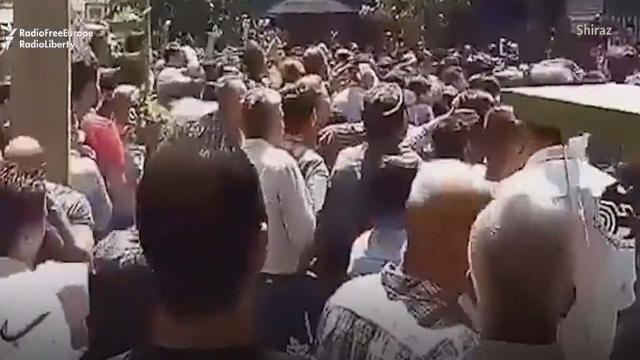Iran’s currency has been unstable since the start of the year. Protesters from Shapour and Najaf Abad in Isfahan shouted out ‘mullahs must go’ and ‘tanks or guns scare us no more.’ Brave protesters from Qahdarijan added to the striking cities in Isfahan. Foreign media described Isfahan and protesting cities of Iran as war zones.
Other cities joined the public protests on Wednesday and Thursday. There were security forces placed on the streets of Shiraz, Arak, Sari, Mashhad and even Tehran. Lots of clashes burst out between protesters and the state forces.
They were all in high-protection clothing with anti-riot gear. The people had only their bare hands to hit back but their unity also gave them strength.
Women and children also participated in protests
Women and youth participated in great numbers, and many were arrested too. A young man taking footage of how tense Gohardasht city was in Isfahan showed two heavy armoured vehicles making their way to the city square accompanied with a travel bus full of troops. He said, "God knows what they have planned for us, it looks like they want war."
Hot water was squirted at protesters from water cannons but it wasn’t enough to hold the courageous people back. Deputy Spokesman for the UN Secretary-General, Farhan Haq, told Fox News that freedom of expression and peaceful assembly needs to be respected by all, including the security forces.
In Shiraz and Tehran protesters cheered the merchants, youth, and taxi drivers to join them on strike. In another video taken by locals, voices are heard saying; if we all come together we can put an end to this regime.
So it’s not only about fixing a 40-year-long corrupt economy but fixing the roots to a free Iran and a stable trustworthy government. Changes to Rouhani’s cabinet and getting commented about on state media or at parliament, suggesting that they are not fit to control the current mess. It proves the big reason behind the sinking currency in Iran lies under the mullah’s turban. President Rouhani wished to play the world with his moderate games but the game is over, as Iranians continuously shout out on the heaving streets.
Plundering the Iranians by state mafia
There are two forms of state plundering in Iran, the kind that rumpled the angry nation. The first is the informal way such as the currency and coin crises. This automatically steals from the people, leaving them with no food to put on the table.
Mohsen Zanganeh, an expert in the current regime, noted last month that “ordinary people cannot buy a coin worth 3 million. The seller and buyer of the coins are both the government.”
The other form is to import many commodities and cars to crush any sort of wealth by others through industry or mines. The Islamic Revolutionary Guards Corps (IRGC) takes away all the country’s natural wealth and smuggles the goods.
One further way to plunder the Iranian people is to increase taxes and tariffs.
Those in government super-escalate commodity prices and public services such as petrol, water, and electricity. The regime knows that soon sanctions will take a big chunk out of it and has decided to step up it is plundering. This has become a catastrophe that affects the whole population.
Again Zanganeh claims, in only twenty days (15 April - 6 May) some 58 tons of coin was presold. The central bank’s statics approves presell of 7 million coins. The question left to ask is where does to money come to buy such an amount? What you understand by friends and see in society is that people take money from their bank to buy coins. Officials tell them to not worry and that there are plenty of coins to buy.
Then the question becomes, do these people really have the right amount of money to spend on the coins?
The banks and institutions have this kind of money, not the people. People don’t have the ability to mess with the coin and currency market. This can only be the work of credit institutions and big factories.
Yahya Ale Eshaq, who served as minister of commerce in the cabinet of Akbar Hashemi Rafsanjani, tells the Arman state-run daily that corruption is purely systematic. If the whole place is running on corruption it’s useless to deal with a few people.
On June 26 a statement approved that the Managing Director of Zayanderud Development Organization in Isfahan receives 65 billion tomans for two hours of work a week.
So the freedom-loving Iranians declared in Isfahan, enough is enough, and they will not tolerate a corrupt state any longer. They tell the government, ‘Death to high expenses!’ Truth is, the people of Iran have been kept away from freedom of living, religion, entertainment, and leisure too long to think of what they might lose with the August 7 sanctions.
Instead, they look ahead to a bright future and a democratic institution founded by the people.




